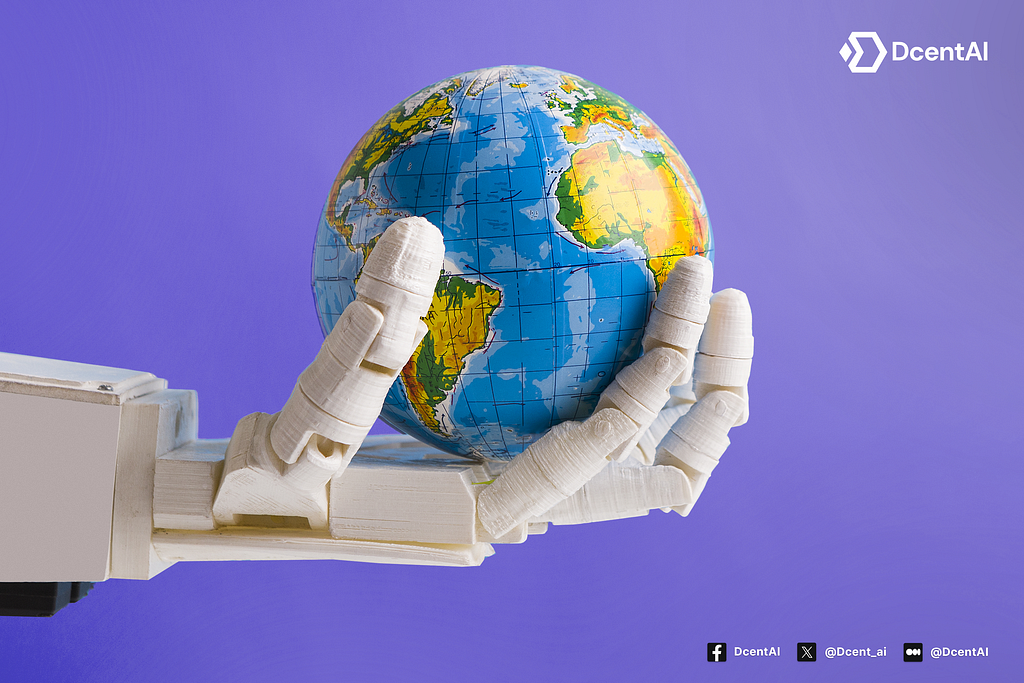The Role of Decentralized AI in Climate Change Predictions and Solutions

The impact of climate change is one of the most pressing issues of our time, requiring fast and creative responses. Ensuring the environment and future generations requires precise climate projections and practical mitigation methods. Data silos, a lack of cooperation, and the computing needs of processing large, complicated datasets are common issues with traditional approaches to climate modeling.
Decentralized AI provides a revolutionary substitute by utilizing distributed networks to provide collaborative, real-time study of environmental data while maintaining data privacy and scalability.The article explores how decentralized artificial intelligence( AI) transforms climate change predictions and propels sustainable solutions. Decentralized AI technologies, like blockchain integration and federated learning, enable academics and businesses to make data-driven opinions for a more environmentally friendly future. Leading the way in decentralized AI advancement, DcentAI is vital to progressing climate models and solutions, empowering worldwide participation, and prevailing significant change in the fight against climate change.
Become a pioneer of DcentAI community!Understanding Climate Change PredictionsClimate change predictions rely on advanced climate modeling, which involves analyzing vast and complex environmental datasets to identify trends and project future scenarios. These models require integrating diverse data types from numerous sources worldwide, such as atmospheric, oceanic, and land-use data. The computing needs of processing large-scale data on centralized frameworks, uneven data standards, and data silos that hinder universal collaboration are some of the major challenges confronting traditional approaches to climate modeling.
Decentralized AI tackles these issues by facilitating distributed data processing, advancing smooth communication across global nodes, and utilizing technologies like blockchain and federated learning to ensure data integrity and privacy. By removing obstacles to data exchange and computation, decentralized AI improves the precision and effectiveness of climate projections, offering vital data to direct sustainable policies and initiatives.
How Decentralized AI Enhances Climate PredictionsTo enhance the accuracy and effectiveness of climate predictions, decentralized AI leverages advanced technologies such as federated learning, edge computing, and blockchain. These technologies enable better collaboration, real-time analysis, and secure data sharing across global networks.
Federated LearningFederated learning enables climate scientists and researchers to collaborate on climate models without centralizing sensitive or proprietary environmental data. Allowing data to remain localized at the source ensures privacy and security while benefiting from shared model training insights. Multiple institutions can contribute data and computing power to build more accurate and robust climate models. This collaborative approach is essential for climate prediction, as it aggregates knowledge from diverse sources, such as different geographic locations, without compromising the privacy or security of the individual datasets.
Edge ComputingEdge computing improves climate projections by facilitating real-time environmental data processing close to its source. For instance, IoT sensors placed in remote zones or vital ecosystems may assess data locally, greatly lowering latency and the requirement for massive data exchanges to centralized servers. Environmental parameters, including temperature, humidity, air quality, and maritime elements, may be followed and assessed almost instantly by processing data at the edge. It allows for more responsive decision-making and quick insights into climatic events. Climate prediction models are accelerated, and bandwidth requirements are decreased because of this localized processing, especially in places where data must be utilized instantly.
BlockchainBlockchain is fundamental for protecting the exchange of environmental data and ensuring openness and confidence in studies on climate change. Using a decentralized ledger, blockchain guarantees that data exchanged between organizations or countries is traceable, verifiable, and tamper-proof. It is particularly important for global climate research initiatives, where collaboration across borders is critical, but data integrity and ownership can often be a concern. Blockchain technology ensures that contributors to climate research maintain control over their data while providing secure access to others for collaborative model building. This integrity-driven approach fosters trust among researchers, supports transparent climate predictions, and facilitates sharing of high-quality data across the global scientific community.
Decentralized AI Solutions for Climate Change Mitigation
Here are some of the decentralized AI solutions for climate change mitigation:
Carbon Emission MonitoringDecentralized AI frameworks, which accumulate and analyze real-time environmental data from distributed sources, are essential for tracking and lowering carbon emissions. Various industrial, transportation, and agricultural sectors’ emission levels are continuously and accurately recorded by these frameworks utilizing decentralized sensors and Internet of Things devices. To optimize emission reductions and implement rules without centralizing sensitive data, AI models may process this data locally or across a network, ensuring privacy while providing valuable insights. This decentralized strategy helps companies, organizations, and governments monitor their carbon footprint and implement focused measures to reduce negative environmental impacts.
Renewable Energy OptimizationDecentralized artificial intelligence is vital in improving the distribution and integration of renewable energy sources, such as hydropower, wind, and solar. It can effectively manage energy flows, adjusting supply and demand in real-time across several locations using decentralized data processing and AI algorithms. To guarantee optimal productivity, these AI models can foresee energy output from renewable sources depending on grid circumstances, climate patterns, and energy storage capacity. Decentralized AI facilitates load balancing and optimizes the dispatch of renewable energy through distributed networks, lowering waste and enhancing power grid resilience while accelerating the shift to cleaner, more sustainable energy frameworks.
Disaster Response and ManagementDecentralized AI analyzes enormous volumes of real-time socioeconomic and environmental data from numerous sources to improve catastrophe preparedness and response. These AI algorithms examine localized data at the edge to discover patterns and forecast climate-related calamities like storms, floods, and wildfires. Disaster management teams may act more quickly by decentralizing data processing, eliminating the need for centralized data, and speeding up crisis responses. Furthermore, decentralized systems can help track resource distribution, coordinate relief, and assess damages, contributing to more effective and efficient disaster management. This proactive procedure increases resilience, assisting communities in better adjusting to the impacts of climate change.
Benefits of Decentralized AI in Climate Solutions
Decentralized AI offers several advantages for addressing climate change, enabling more effective, scalable, and secure solutions across industries and regions.
Increased Collaboration Across BordersDecentralized AI promotes global collaboration by allowing multiple stakeholders, such as governments, researchers, and organizations, to share insights without centralizing data. It enables international cooperation in climate solutions while ensuring secure, efficient data sharing via federated learning and blockchain, thus fostering transparency and trust.
Enhanced Data Privacy and OwnershipDecentralized AI removes the threats related to centralized storage by ensuring that data contributors maintain ownership and control over their environmental information. It underpins privacy and permits more companies to exchange private data without worrying about misusing it.
ScalabilityDecentralized AI efficiently manages large-scale, diverse datasets by distributing computational tasks across a network. This scalability ensures that vast amounts of climate-related data can be processed and analyzed in real-time, enabling faster insights and more effective climate action.
Real-Time Insights for Proactive Climate ActionWith edge computing, decentralized AI provides real-time insights into climate data, allowing immediate action. It speeds up responses to climate risks, resource management, and policy interventions, ensuring timely adaptation to changing environmental conditions.
Challenges and ConsiderationsWhile decentralized AI offers great potential for addressing climate change, several challenges must be overcome to ensure effective application.
Data Quality and StandardizationWith decentralized AI, data comes from multiple, often diverse sources, leading to inconsistencies in format, quality, and accuracy. Ensuring uniformity in decentralized datasets is crucial to derive reliable insights. DcentAI can help mitigate this challenge by utilizing advanced data validation algorithms and standardization frameworks within its decentralized network. By incorporating AI-powered tools that validate and normalize data before it is processed, DcentAI ensures that datasets remain consistent and high-quality across various contributors and nodes.
Infrastructure DemandsDecentralized climate models require robust infrastructure to support vast data storage, processing power, and real-time analytics. Establishing the infrastructure to handle such complex models can be costly and technically challenging. DcentAI’s distributed architecture connects nodes globally and can alleviate this challenge by enabling scalable, decentralized computation and storage. By leveraging DcentAI’s infrastructure, climate researchers and organizations can tap into a global network of resources, reducing the need for heavy investments in centralized systems while ensuring high computational power for climate modeling.
Regulatory HurdlesClimate data sharing and AI implementation face regulatory challenges, as different countries have varying laws and policies regarding data privacy, usage, and sharing. Aligning global policies for climate data and AI use is a complex issue. By integrating blockchain technology, which provides transparent, secure, and auditable data exchanges, DcentAI can help address these issues. Blockchain facilitates cross-border data sharing and ensures adherence to nearby data security laws. The decentralized approach of DcentAI makes it simpler to explore legal obstacles in climate action programs worldwide by ensuring that all participants maintain sovereignty over their data while abiding by local regulations.
To Sum it UpDecentralized AI has enormous potential for addressing the complicated issues related to climate change by facilitating collaborative, real-time data handling and predictive modeling. AI can provide more precise and valuable insights by improving climate forecasts, monitoring carbon emissions, and optimizing the usage of renewable energy sources through decentralized frameworks.
Leading this development is DcentAI, which promotes a global approach to sustainability and empowers enterprises worldwide to collaborate without sacrificing data privacy.DcentAI plays a key role in accelerating the shift to a more resilient and sustainable future by fostering the creation of climate solutions and advancing transparency via federated learning and blockchain.
Become a pioneer of DcentAI community!To learn more about DcentAI, visit our Facebook and X accounts.The Role of Decentralized AI in Climate Change Predictions and Solutions was originally published in Coinmonks on Medium, where people are continuing the conversation by highlighting and responding to this story.
